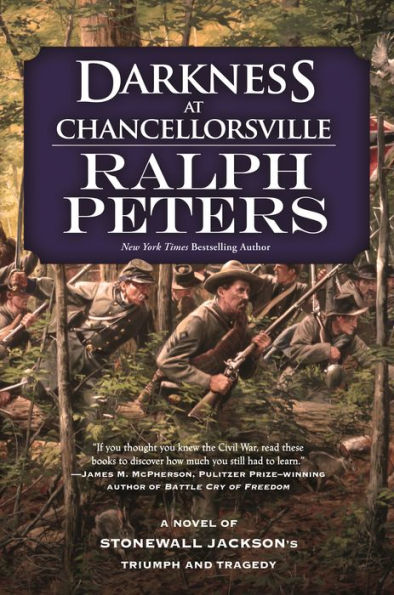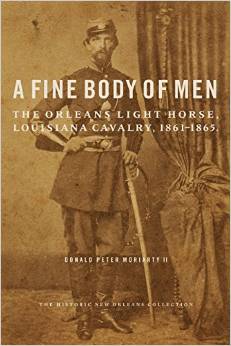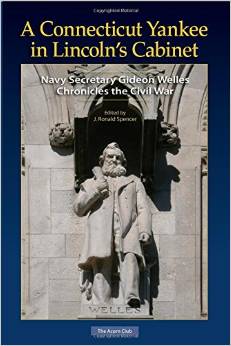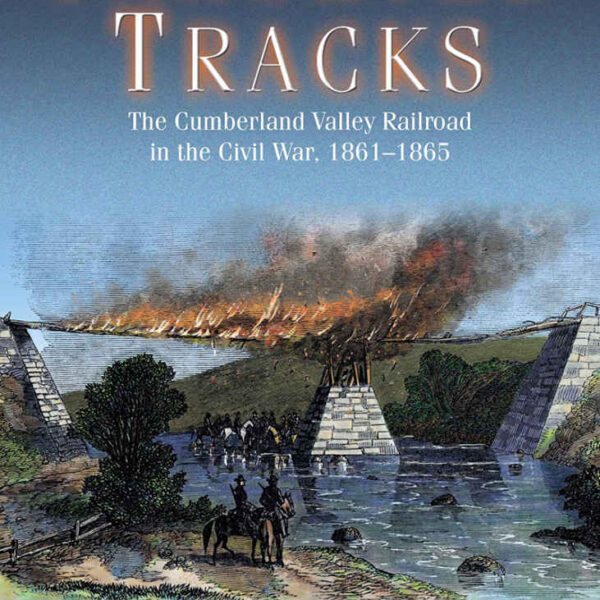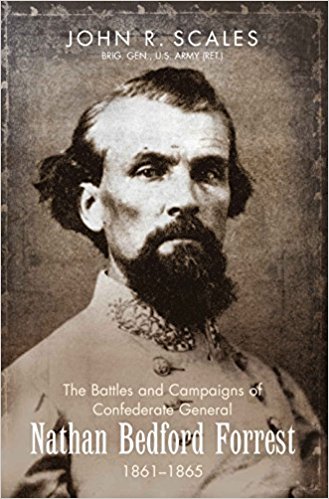A favorite blood sport of the Civil War community is to pick apart the historical accuracy of novels and movies. I’m going to avoid that with Ralph Peter’s new novel Darkness at Chancellorsville for two reasons. First, the inaccuracies are few and minor, and a couple might be the result of honest differences in historical interpretation. Second, they do nothing to interfere with the fine story Peters tells.
In fact, I really have only two criticisms of the novel, and the first is probably something most readers won’t even mind.
Darkness at Chancellorsville begins with a 30-page prologue that recounts the May 17, 1863, battle of Kelly’s Ford. Aside from introducing readers to Jeb Stuart, who’s one of a dozen or so major characters in the book, the prologue has no other real connection to the story. It correctly frames the fight as an attempt by the Federal cavalry to build its own confidence, but that theme never comes back into play later in the book—nor does the Federal cavalry, for that matter. It’s as if Peters simply wanted an excuse to write about Kelly’s Ford, and so he did. If that’s the case, I doubt readers will begrudge him. The action is great, and the writing effectively captures the flavor of the characters. But at 384 pages, the book begins to feel a tad long by its end, so those 30 pages at the start do matter.
The second criticism deals with the book’s subtitle, “A Novel of Stonewall Jackson’s Triumph and Tragedy” (which might actually be a decision by he publisher’s marketing department rather than of Peters).
Jackson is a prominent character, for sure, and Peters admits Jackson fascinates him. “[H]e remains the only major Civil War figure more enigmatic than Grant,” Peters writes in his illuminating “Author’s Note” at the book’s end.
But Jackson is, by no means, the main protagonist of the novel. If the book belongs to anyone, it’s probably Hooker as a kind of antihero. “If the war had killed many another man, the war had saved Joe Hooker,” Dan Butterfield muses at one point.
Similarly, the “triumph and tragedy” could just as well have been Lee’s. The Gray Fox won his so-called “greatest victory” at the cost of a stunning 13,000 casualties—and he was unable to fully follow up on that victory. Lee himself considered the outcome more frustrating than his victory at Fredericksburg the previous December.
But the “tragedy” in Jackson’s narrative arc never comes. The book doesn’t extend as far as his May 10, 1863, death at Guinea Station. Some readers may be disappointed, Peters writes in his author’s note, that he avoids the “oft recited, drawn-out, high-Victorian version of Jackson’s death” usually depicted in “hagiographic memoirs and psuedo-histories, in popular novels and films.” He contends, “Such frilly, pastel nonsense slights Jackson’s suffering, sacrifice, and bewildering complexity.”
While that might indeed be true, the spot where Peters does leave off with Jackson’s story feels unresolved. Assuming readers already know what happens to Jackson, we can fill in the tragedy ourselves, but the book itself never closes the loop. That, in turn, raises the larger question, “Why read the novel in the first place if it’s going to assume we know what happened?”
That’s an important point, particularly because the greatest strength of Darkness at Chancellorsville is that it effectively and engagingly invites us to “read history forward.” Peters is a fantastic storyteller who pulls the reader in and makes him or her want to know what happens next. We’re not reading as historians with the benefit of hindsight that history offers us. Instead, inside the story, in the moment, we don’t know what’s going to happen next.
For instance, when Lee rides into the Chancellorsville intersection on May 3 and then hears about John Sedgwick’s approach from the east, the battle’s outcome still feels very much in doubt. When the Union corps commanders arrive at Hooker’s headquarters on the night of May 4 for a Council of War, they don’t know what Hooker will decide. Peters keeps us in the story without letting historical hindsight spoil it for us.
Another of Peters’ strengths is his ability to humanize the key players in ways that history cannot. That’s a fiction writer’s superpower. Peters imbues Joe Hooker, Dan Butterfield, and Dan Sickles—a rogues’ gallery if ever the Union high command saw one—with redeeming qualities and sympathetic sides that actually give readers things to think about that may help them better understand the campaign. For instance, blistering headaches, so bad I could almost feel them off the page, plague Hooker during the battle, inviting a whole new reconsideration of his actions.
Lee shows frailties instead of just a marble facade. Jackson is “an odd man…graceless, but touched with immense gifts,” described elsewhere as “a hanging judge with a child’s heart: earnest and awkward, implacable.”
In the lead up to the fighting on May 2, I especially appreciated Peters’ effectiveness at getting inside the heads of officers in the Union XI Corps. When battle erupts, they aren’t quite so easily dismissed as “Flying Dutchmen”; instead, their plight and flight (and scattered stubborn resistance) becomes understandable, noble, and doomed rather than just a subject of mockery.
Peters captures character brilliantly in short phrases, too. Jeb Stuart “was a wizard of sheer presence, colorful as a one-man medicine show.” Jubal Early “blasphemed to shame Lucifer, his high-pitched voice turning sulfur into sound.” Vladimir Krzyzanowski “sat fiercely upon his horse, as if bullets had best avoid him.” Peters sprinkled such jewels liberally through the text, and I delighted at every one.
Peters’ pacing at the beginning of the book feels manic, jumping between his many characters in short bursts, but once Jackson’s May 2 flank attack rolls forward, Peters hits his stride and the pacing becomes pitch perfect. The narrative comes to life in one of the best-written battle sequences I’ve ever read.
Peters ends with a thoughtful author’s note, full of insights even the most seasoned Chancellorsville student will find worth pondering. It was an excellent capstone to an enjoyable book. Readers looking for good Civil War fiction will enjoy Darkness at Chancellorsville.
Chris Mackowski of the Emerging Civil War blog is the author of many Civil War titles, including The Last Days of Stonewall Jackson.
